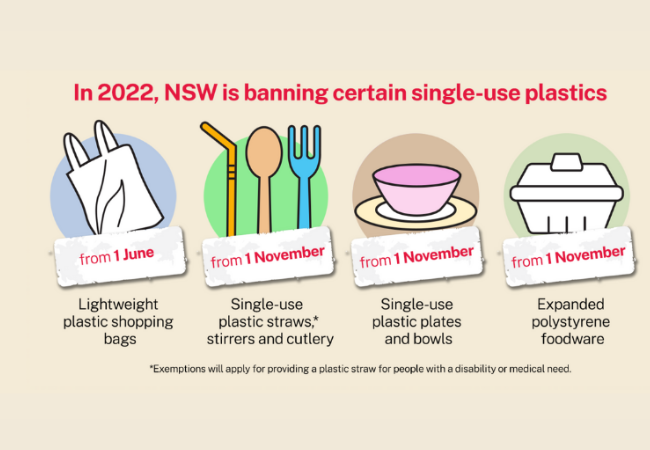
Phasing out single-use plastics in NSW
As published here by the NSW Government Planning and Environment.
About the ban
On 16 November 2021, the NSW Government passed the Plastic Reduction and Circular Economy Act 2021. This legislation delivers on the government’s commitment to ban certain problematic plastics, such as single-use plastics and address the problem of plastic waste.
Input from over 16,000 people helped develop this legislation and the related NSW Plastics Action Plan. Support for action on plastic waste was widespread with 98% supporting a phase out of single-use plastics.
This legislation provides a comprehensive framework that will help transition NSW towards a circular economy where materials and resources are valued and kept in the productive economy while creating jobs and protecting the environment and the community.
From 1 June 2022 the following will be banned:
The supply of lightweight plastic bags
A lightweight plastic bag is one with handles that is 35 microns or less in thickness at any part of the bag.
Lightweight bags made from biodegradable, compostable, or bio-plastics will also be banned, including those made from Australian certified compostable plastic.
The ban does not apply to:
- barrier bags such as bin liners, human or animal waste bags
- produce bags and deli bags
- bags used to contain medical items (excluding bags provided by a retailer to a consumer used to transport medical items from the retailer)
From 1 November 2022 the following will be banned:
Single-use plastics straws, stirrers and cutlery
The ban applies to single-use plastic straws*, stirrers and swizzle sticks, and cutlery, including forks, spoons, knives, sporks, splayds, chopsticks, and food picks.
The ban applies even if these items are made from biodegradable, compostable, or bio-plastics. This includes those made from Australian certified compostable plastic.
The ban does not apply to:
- serving utensils such as salad servers or tongs
- items that are an integrated part of the packaging used to seal or contain food or beverages, or are included within or attached to that packaging, through an automated process (such as a straw attached to a juice box).
*Exemptions will apply in certain settings for people with a disability or medical need so they can continue using straws.
The detail of the exemption will be developed in consultation with the disability sector and other impacted stakeholders.
Single-use plastic bowls and plates
The ban applies even if these items are made from biodegradable, compostable, or bio-plastics. This includes those made from Australian certified compostable plastic.
The ban does not apply to:
- single-use plastic bowls designed or intended to have a spill-proof lid, such as those used for a takeaway soup.
Expanded polystyrene (EPS) food service items
The ban applies to EPS takeaway food service items, such as clamshells, cups, plates and bowls.
The ban does not apply to EPS:
- meat or produce trays
- packaging, including consumer and business-to-business packaging and transport containers
- food service items that are an integrated part of the packaging used to seal or contain food or beverages, or are including within or attached to that packaging, through an automated process (such as an EPS noodle cup)
Single-use plastic cotton buds and microbeads in certain personal care products
The ban applies to single-use plastic cotton buds and rinse-off personal care products containing plastic microbeads, such as face and body cleansers, exfoliants and masks, shampoo, conditioner and hair dyes, and toothpaste.
If you are concerned about microbeads in products, look for the following commonly used ingredients:
- polyethylene (PE)
- polypropylene (PP)
- polyethylene terephthalate (PET)
- polymethyl methacrylate (PMMA)
- nylon (PA)
Who does the ban apply to?
A person must not supply a prohibited item in NSW while carrying on a business.
This includes supplying the item while:
- carrying on an activity for commercial purposes. For example:
- retail businesses like a restaurant, cafe, bar, takeaway food shop, party supply store, discount store, supermarket, market stall, online store, and packaging supplier and distributor, and any other retailer that provides these items to consumers.
- a manufacturer, supplier, distributor or wholesaler of a prohibited item
- carrying on an activity for charitable, sporting, education or community purposes. For example, a community group, not-for-profit organisation or charity, including those that use a banned item as part of a service, for daily activities or during fundraising events.
For information visit the plastics ban website.
